Last Updated on 3 months ago by Gila
New here? Start with Affiliate Marketing 101, grab the Starter Kit, validate ideas with this guide, and get WA training tips.

Finding the perfect niche for your online business can really make a difference in your growth and how you connect with your audience. A focused niche helps your brand stand out while making your marketing and product creation much more straightforward. If you’re starting out or thinking about narrowing your focus, there are a few things that can help you avoid common mistakes and increase your chances of success. Here, I’ll go through some practical do’s and don’ts of niching down so your online business can thrive. Let’s explore The Do’s And Don’ts Of Niching Down Your Online Business.
TL;DR: Niching down your online business means choosing one clear audience and problem so your content, offers, and marketing all pull in the same direction.
- List your interests, skills, and real-life experience before chasing “hot” niches.
- Check that your niche has demand: active groups, search volume, and products already selling.
- Get specific, but not tiny – avoid trying to reach “everyone” or only a handful of people.
- Run a tiny validation test: one-page landing, a trickle of traffic, and simple sign-up or click goals.
- Start with a focused content plan (3–5 hubs with 4–6 spokes each) that solves real problems.
- Stay flexible: refine your niche as you learn, instead of pivoting wildly every week.
The Big Picture: Why Niching Down Online Business Matters
Niche down your online business by focusing on a specific audience or product category, rather than trying to appeal to everyone. A narrower focus gives you a better shot at standing out in a crowded market. Big online businesses such as Zappos or Etsy started with highly defined niches before expanding their success. As the e-commerce world keeps growing (over $6 trillion in expected revenue by 2027), having a unique angle makes connecting with your ideal customer more manageable and cost-effective.
Picking a niche isn’t about boxing yourself in. It’s about making your efforts more efficient by serving a group of people with shared needs or interests. When you know who you’re talking to, things like product development, advertising, and even website copy become a lot less stressful. You can focus resources where they matter most and build trust faster with your customers.
As online markets get more crowded, customers expect tailored experiences and solutions. By focusing on a particular group, you’re able to truly speak their language, step up the value you offer, and create community. This all makes your marketing dollars stretch further, as you’re reaching people who not only are more likely to buy, but are also more likely to become loyal fans who tell their friends.
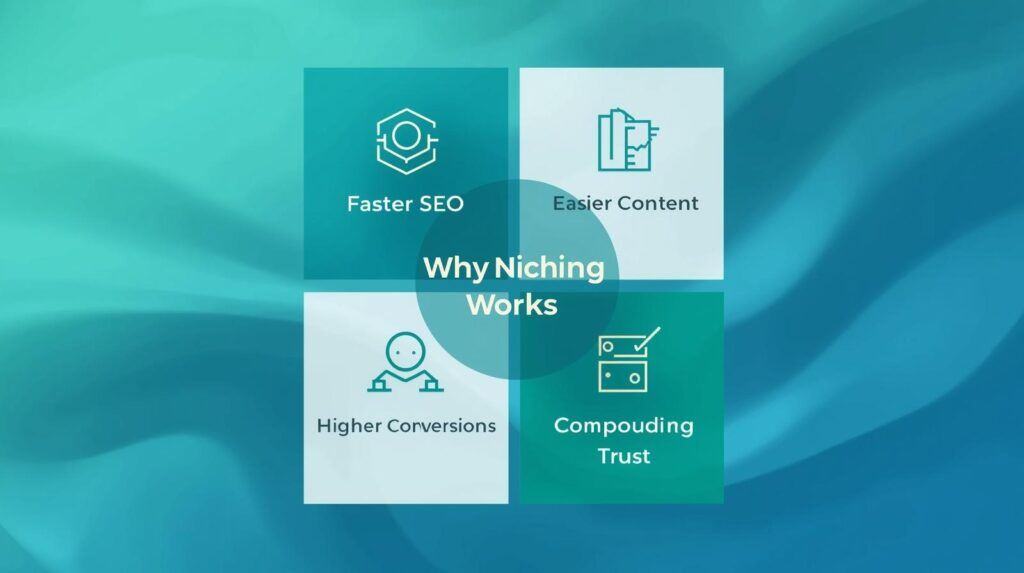
Getting Started: How to Find Your Ideal Niche
Understanding the Do’s and Don’ts of Niching Down Your Online Business can guide your strategies and help you avoid pitfalls.
Once you start brainstorming niches, these guides can help you shape and test your ideas calmly:
Start by asking yourself what you’re genuinely interested in and what skills or insights you can offer. Research trends and gaps—Google Trends and keyword research tools make this pretty simple. Look at online communities and forums to see what problems people need solved. Even reading Amazon reviews can spark a profitable idea.
A niche should feel natural to you. It’s not just about profitability; it’s also about sustainability—picking something you like makes it easier to stick with it for the long run. Start by listing out your interests, skills, or passions. Group them by industry, and ask yourself:
- Who needs this? Can you clearly see a group of people with this problem or interest?
- Can I offer something different? Is there a way to do it better, faster, or in a more unique way?
- Is there evidence of demand? Are people searching for solutions, or are there products already selling?
Do’s and Don’ts of Choosing and Building Your Niche
There’s no one-size-fits-all blueprint, but sticking to some tried-and-true do’s and don’ts makes the adventure smoother.
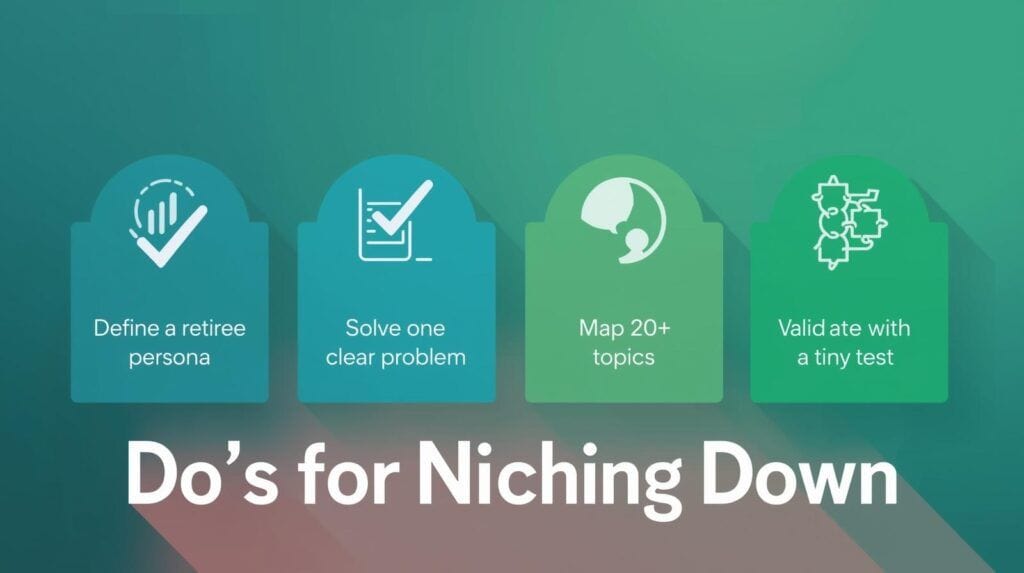
As you narrow your niche, it helps to see how different online business models behave over time:
- Do: Get Specific. Go beyond broad topics. Instead of “fitness,” go for something like “at home HIIT workouts for busy moms.” The more focused you are, the easier it is to become a go-to resource.
- Don’t: Make It Too Narrow If only a handful of people are interested, it can be tough to turn a profit. Make sure your audience is big enough to grow with.
- Do: Validate Your Idea. Check search volumes, forum activity, and social media trends. Try running a paid ad campaign to gauge interest or launch a simple MVP (minimum viable product) to test the waters.
- Don’t: Ignore the Competition. Competition is a sign of demand, so don’t be scared off if others are doing well in the space. Instead, look at what they lack and where you can shine.
- Do: Solve Real Problems Businesses grow faster when they address actual pain points. Listen for problems in Facebook groups, product reviews, or Reddit communities.
- Don’t: Choose Based on Fads Alone. Chasing trends can work, but it’s risky. If you’re not genuinely interested and the trend fizzles, motivation and profits might drop off fast.
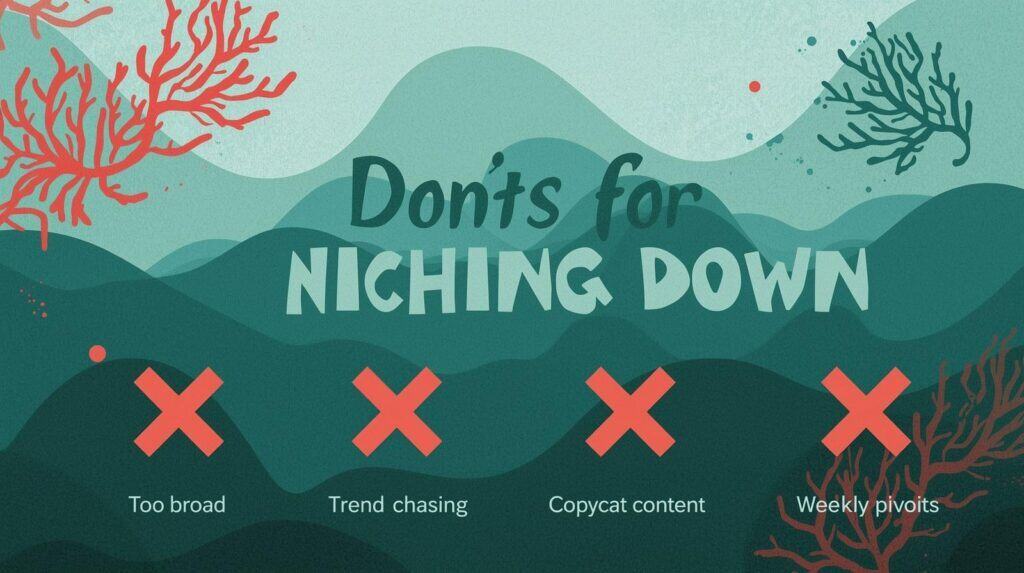
When you’re narrowing down, run some quick tests. You could post in relevant forums and ask for opinions, test interest with a quick survey, or check out similar products’ reviews and see what people love or hate. Validating early can help avoid wasted effort later.
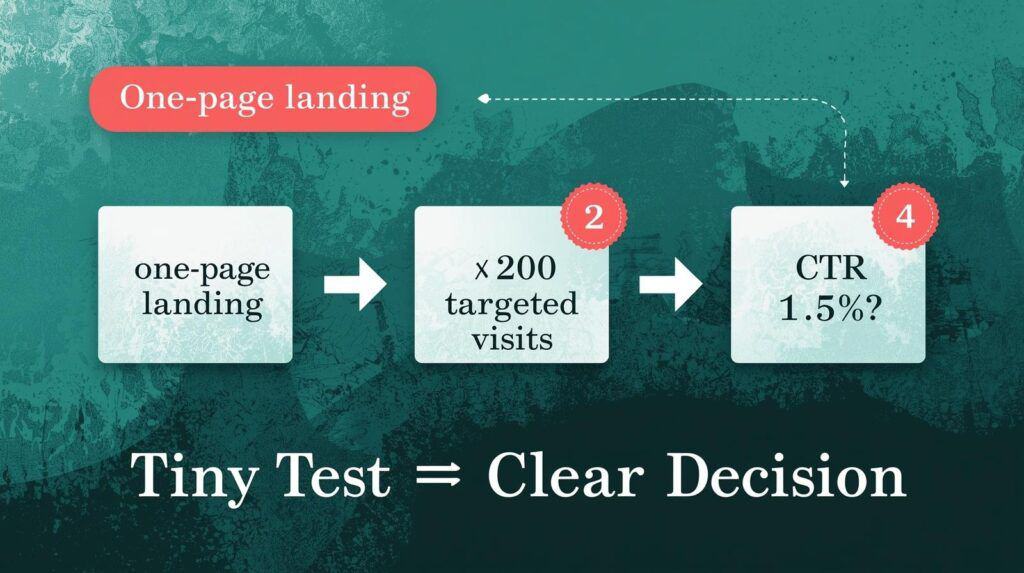
Common Pitfalls to Watch Out For
Even after you’ve picked a niche, there are a few easy mistakes to avoid. Extra awareness at this stage can save a lot of frustration—and money.
- Overcomplicating Your Product Range Offering too many products, especially before you’ve established yourself, can confuse customers. Start small, refine your core offer, and expand when you understand your audience better. With a simple lineup, you can also gather feedback more easily and respond fast.
- Trying to Please Everyone Businesses that try to serve everyone often end up connecting with no one. It’s okay to turn some people away. Focusing on a specific community helps build loyalty and word of mouth.
- Underestimating Marketing Needs Even with the perfect niche, you need to consistently market and talk about your brand. Ditch the “build it and they will come” mindset. Ongoing outreach is key, so set a schedule and stick to it.
- Ignoring Feedback Early feedback helps shape your products and messaging. Regularly check in with your community and act on the things they say. This keeps your offer relevant and lets people know you truly care about their experience.
Practical Ways to Nail Your Niche
Once you’ve settled on your niche, focus on these steps to build momentum and set yourself up for real growth.

When your niche is clear, the next step is building simple content and traffic systems around it:
- Create Persona Profiles: Put together a simple description of who your ideal customer is. Give them a name, describe their problems, and keep this in mind when creating content or ads.
- Focus Your Content Strategy: Share genuinely helpful articles, videos, or social posts that address the needs of your audience. Answer questions they’re already asking with straightforward, practical advice.
- Connect With Your Audience: Set up an email list, start a group, or join an existing community. Brands that feel accessible inspire more loyalty and trust, opening the door for valuable, ongoing conversations.
- Keep Evolving: Don’t just set your business and forget it. Regularly size up new trends, competitor moves, and changing audience needs to refine your niche over time. Staying flexible helps you adapt and grow as markets shift.
Challenges You Might Face (And What to Do)
Niching down isn’t always smooth sailing. Here are some hurdles that pop up most often and what’s worked for me and others in the past:
- Worrying About Excluding People It’s tempting to cast a wide net, but clear focus generally means a smaller audience that’s more likely to buy. Growth can still happen. Once you dominate your chosen niche, you can expand into closely related areas as your reputation grows.
- Feeling Boxed In If you start to feel stuck, remember that most successful brands have grown by slowly adding related products or serving adjacent customer groups. Start with one clear direction, then keep an eye on new opportunities that naturally complement your current offering.
- Market Changes Trends, technology, and demand can switch up quickly. Make a habit of monitoring discussion forums or industry reports to stay ahead of big changes. Don’t be afraid to adapt if your audience’s needs start to move in a different direction—flexibility is your friend.
Having a network of likeminded entrepreneurs or mentors really helps. They can offer objective advice and let you know when you might be veering too far off track, or when you need to pivot. Community makes challenges feel lighter and solutions easier to spot.
Real World Examples: Niches That Clicked
Here are a few online businesses that have nailed their niche and saw real rewards:
- Planner Companies for Busy Moms Businesses like Erin Condren grew by designing planners specifically for overwhelmed moms juggling work and family. Community building and relatable products helped them expand from a tiny audience to a huge one. They tracked down exactly what busy moms needed and leaned in fully.
- Vegan Snack Boxes Companies that focus just on vegan, allergy friendly, or gluten free snack boxes tapped into audiences with very specific dietary needs and built strong recurring revenue through subscriptions. They solved for a clear pain point and made it easy for their ideal customers to stay loyal.
- Pet Accessories for Small Dog Owners Designing harnesses, toys, and clothing for tiny dogs tapped into a passionate base usually overlooked by big pet shops focused on all breeds and sizes. Building with that audience at the center made their marketing and product designs extra compelling.
These examples show how starting small and specific can lead to bigger opportunities once you build trust and recognition. Once momentum picks up, it’s natural to branch out by adding products or reaching related audiences.
Frequently Asked Questions About Niching Down
Here are some questions I hear pretty often about niching down an online business:
Question: How do I know if my niche is too small?
Answer: Search for online groups, active social media hashtags, and existing products on major platforms. If you find lots of active discussion and purchase behavior, it’s a healthy-sized market. If everything looks empty or abandoned, it may be worth broadening out a little.
Question: What’s the fastest way to test a niche idea?
Answer: Try putting together a simple landing page and running targeted Facebook or Google ads. Watch for signups, clicks, or even pre-orders to see if there’s real interest. You can also post about your idea in relevant forums or groups and look for feedback or questions.
Question: Can I change my niche if it isn’t working out?
Answer: Absolutely. Businesses glow up all the time. Use what you learn along the way to pivot into adjacent areas, and don’t be afraid to iterate as you go. Flexibility is a sign of a savvy business owner, and your audience will follow if your messaging is honest about the changes.
Wrapping Up: Smart Niching Is All About Clarity and Community
Niching down isn’t about limiting your future. It’s about making your marketing, messaging, and product creation clearer and more effective from the start. When you really understand your audience, listen to what they need, and focus your efforts, you can build an online business that stands out and grows steadily. Stay flexible, keep an eye on what’s working, and stay connected to the people you serve. That’s the easiest path to a business with lasting impact.
Start small, go deep, and let your growth follow the needs of your devoted customers. You’ll usually find that great things happen from there as your brand becomes more recognizable and your audience keeps growing.
Next Steps: Turn Your Niche into Gentle Action
If this guide helped you see your niche more clearly, your next step doesn’t have to be big. Choose one audience, one problem, and one small promise you can make this month, and let that be your starting point.
To make things easier, you can download my free Affiliate Marketing Starter Kit for Beginners . It gives you calm, beginner-friendly checklists for choosing a niche, planning content, and tracking your progress without overwhelm.
If you’d like structured training, tools, and a friendly community while you build around your niche, you can also learn inside Wealthy Affiliate . Their lessons and website platform pair well with the niching process in this article: you focus on a clear audience, publish helpful content, and grow at your own pace.
For this week, pick one tiny task—refining your niche statement, outlining a content hub, or talking to a few people in your audience—and let that be enough. Small, steady steps are what turn a focused niche into a lasting online business.
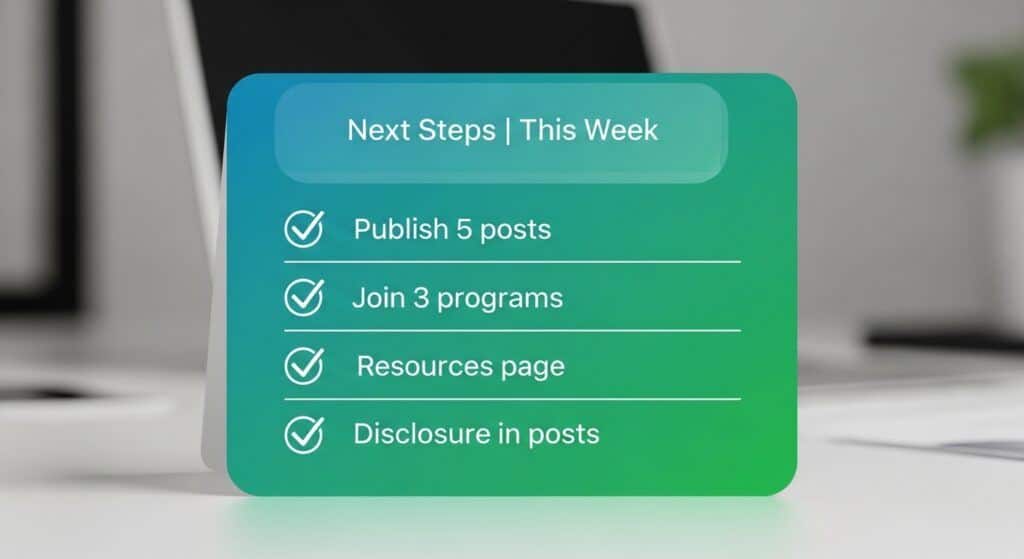


Niching down is one of the most powerful strategies for online business success, yet it’s also one of the most misunderstood. The biggest mistake people make is fearing that a narrower focus means fewer opportunities. In reality, it amplifies your authority and attracts a more engaged audience. However, the key is to find a niche that’s not just specific but also sustainable and profitable. Instead of choosing a niche solely based on passion, validate it by researching demand, competition, and monetization potential. But don’t box yourself in too tightly — allow room for growth and evolution as market trends change. How have you approached niching down in your business, and what challenges have you faced in the process?
Thanks for the insightful comment, AJnaval! You’re absolutely right — niching down is both a superpower and a stumbling block for many entrepreneurs. The fear of missing out on potential audiences can be paralyzing, but in my experience, focusing on a well-defined niche has actually opened more doors than it closed. It’s helped me build trust faster and create more targeted offers.
I learned (the hard way) that passion alone isn’t enough. I had to dig into keyword data, audience pain points, and revenue models to make sure my niche wasn’t just a personal interest — it had to make business sense too. The biggest challenge for me was balancing clarity with flexibility: defining the niche clearly while staying open to evolve as I gathered more feedback and data.
Curious — how did you validate your own niche, and have you ever had to pivot along the way?
Hi Gila,
This article really drove home the importance of finding a specific niche for an online business. I love how the author emphasized that niching down isn’t about limiting yourself, but rather about making your marketing and product development efforts more efficient and effective.
One point that really resonated with me was the idea of solving real problems for a clearly defined audience. By focusing on the unique needs and pain points of a specific group, you can create more compelling offers and build stronger connections with your ideal customers.
I’m curious to hear your thoughts on this approach. Have you had experience with niching down in your own online ventures? If so, what strategies did you find most helpful for identifying and serving your target market?
I also wonder if you think there are any situations where having a broader focus might be advantageous, at least in the early stages of an online business. While I agree that specificity is key for long-term growth, could casting a wider net initially help with testing and validating different niches?
Looking forward to hearing your perspective on this! I think this is such a crucial topic for anyone looking to build a thriving online brand.
All the Best,
Eric
Hi Eric,
Thank you for such a thoughtful and well-articulated comment! I’m really glad the article resonated with you—niching down is one of those concepts that can feel limiting at first, but as you noted, it actually opens the door to more focused and effective business growth.
To your question—yes, I’ve absolutely experienced the power of niching down in my own ventures. What helped me most was starting with a combination of personal interests and market research. I paid close attention to recurring questions in forums, common challenges shared in social groups, and even the gaps in content or services offered by competitors. From there, I tested small content pieces or lead magnets to see what clicked. That gave me great insight into where the real demand was.
And I completely agree with your point about casting a wider net in the early stages—it can be a smart move, especially when you’re still learning about your audience and refining your message. The key is to start broad with the intention of narrowing down. That way, you can explore a few directions without losing clarity on your core goal: to eventually serve a specific group in a powerful, authentic way.
Thanks again for contributing to the conversation with such valuable questions—I always appreciate hearing from thoughtful readers like you!
All the best,
Gila